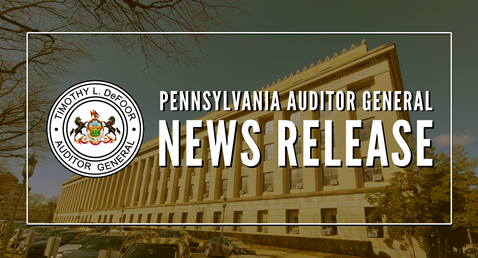Auditor General DePasquale Finds Dog Law Enforcement Hindered by Lax Leadership, Inadequate Financial Controls
Over 4 years, $8 million from dog law fund used for unrelated purposes
Auditor General DePasquale Finds Dog Law Enforcement Hindered by Lax Leadership, Inadequate Financial Controls
Over 4 years, $8 million from dog law fund used for unrelated purposes
HARRISBURG (July 15, 2013) – Auditor General Eugene DePasquale said today that the Department of Agriculture must continue to improve enforcement of the dog law program and management of the restricted dog law account from which $8 million was used for unrelated purposes.
A performance audit of the dog law program from 2008 through 2012 shows an intentional lack of enforcement of the state’s dog law and the commercial kennel canine health regulations. During the audit period the dog law restricted revenue account went from $15 million to $3.1 million — $4 million was transferred to the state general fund in 2010, $2.6 million was used for unsupported payroll costs, and $1.4 million was used for unsubstantiated expenditures.
“I am shocked that the department wasn’t prepared to enforce the law specifically written to protect puppies and potential owners,” DePasquale said. “But, I am more appalled that it turns out the department knew there were violations of the law and instead of correcting the problems they decided not to conduct inspections. How would neighbors feel if police officers avoid a street corner when they know there is a drug deal going down?
“Before the new law went into effect in July 2011, Pennsylvania had one of the worst reputations in the country for allowing puppy mills. Now, we find out that the law changed but enforcement was so poor that there was little impact to alleviate puppy mill conditions.
“As a result of lax enforcement, people could be exposed to dangerous dogs, consumers could be emotionally and financially affected by sick dogs from puppy mills and the dogs themselves could be physically harmed by living in unhealthy conditions.
“I applaud the Department of Agriculture’s efforts since our audit to improve administration of the dog law program and at some point I look forward to auditing the results of those efforts,” DePasquale said.
Key findings of the audit include:
- $2.6 million in unsupported payroll expenditures charged to the restricted dog law account for 12 employees of the Department of Agriculture who were not employed by the dog law program and for six people employed by the program who had some duties elsewhere in the department;
- $1.4 million in unsubstantiated general government administrative expenditures allocated to the dog law restricted account ($4 million was transferred to the state general fund budget in 2010);
- failure to adequately compel/persuade dog owners to license their dogs — especially dogs deemed dangerous because they attacked people in the past — which has dramatically affected the amount of funds available in the dog law restricted account used for dog law enforcement;
- lack of written standard operating procedures for administering the dog law, including procedures for wardens to follow when performing job responsibilities;
- lack of required formal training for dog wardens in areas such as dog law and regulations; Pennsylvania criminal law and procedure; dog handling and humane capture; proper dog sanitation and shelter, and kennel inspection procedures as well as passage of a final examination;
- loss to the dog law restricted fund of more than $200,000 annually because of a cap in a 1987 law that redirects funds to modernize the judicial system computers; and
- failure to track the number of dogs sold or transferred by kennels at year-end to determine whether the kennels are properly licensed as either commercial or non-commercial kennels.
To correct problems identified in the audit, DePasquale’s report includes 18 recommendations for the Department of Agriculture, including:
- effectively enforce the dog law and canine health regulations;
- establish a leadership team dedicated to ensuring that the department effectively administers the dog law program, to include establishing an adequate management control structure;
- be proactive in enforcing the dog law to maximize the revenue deposited in the dog law restricted account and limit the use of funds to dog law expenditures only;
- evaluate other methods for persuading/compelling dog owners to annually license their dogs and consider revising the current dog license fee structure by reviewing how other states structure their dog license programs;
- continue to assist county treasurers to make dog licenses more convenient and available and advocate for license purchases over the Internet;
- properly track all incidents resulting in the classification of a dangerous dog and ensure that all such dogs are annually licensed;
- pursue amendment to the 1987 judicial computerization funding act to eliminate or increase the cap amount for revenue generated out of fines and penalties issued through dog law citations (legislation is pending in the House and Senate, House Bill 913 and Senate Bill 718);
- ensure that all dog law enforcement personnel understand and comply with the formal standard operating procedures, especially conducting inspections and issuing citations, to ensure that the procedures are consistently applied;
- immediately develop formal dog warden training as required by the dog law and ensure that all dog wardens complete the training, and pass the final examination;
- oversee and monitor the activities of the dog wardens, including the issuance of citations for the lack of dog licenses and other offenses, through the use of applicable reports and reviewing them on a periodic basis; and
- develop written procedures for monitoring the number of dogs transferred each calendar year to ensure that kennels are properly licensed.
# # #
Return to search results